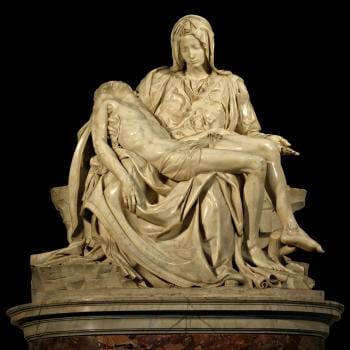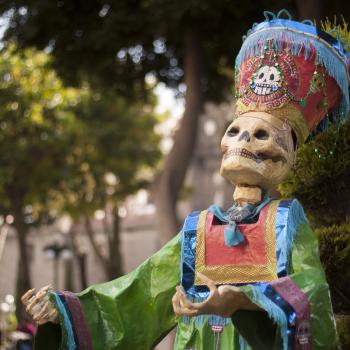One of the things I find appealing about the Catholic faith is it’s practical universality. That is to say, it has room for opposites. So, for example, Catholicism is a religion with the highest levels of aesthetic accomplishment. We have Palestrina and Vivaldi and Michaelangelo and DaVinci and Caravaggio and Mozart and Fra Angelico and the Sistine Chapel and Chartre Cathedral etc. etc. etc. But we also have folk religion and kitsch. We have holy water bottles shaped like the Blessed Virgin with a crown for the cap. We have postcards that change from Jesus to Mary when you move them, gaudy rosaries, day glo vestments and awful statues with glass eyes.
 Now the aesthetes among us may well roll their eyes and ‘tut tut’ at the excesses of popular devotion. They may look on the tat and kitsch with dismay, but they can’t get around the fact that this is a religion for princes and paupers. This is a religion for Phds and peasants. If a religion was all good taste, fine music, exquisite architecture, sublime artwork and refinement I would be suspicious of it for it would not be the religion of the people. Likewise, if a religion were all kitsch, tacky tat, vulgarity and ugliness I would be equally suspicious. Neither of them could be a universal religion. Instead both would be limited by the taste (either high or low) of their devotees.
Now the aesthetes among us may well roll their eyes and ‘tut tut’ at the excesses of popular devotion. They may look on the tat and kitsch with dismay, but they can’t get around the fact that this is a religion for princes and paupers. This is a religion for Phds and peasants. If a religion was all good taste, fine music, exquisite architecture, sublime artwork and refinement I would be suspicious of it for it would not be the religion of the people. Likewise, if a religion were all kitsch, tacky tat, vulgarity and ugliness I would be equally suspicious. Neither of them could be a universal religion. Instead both would be limited by the taste (either high or low) of their devotees.
What is authentic about Catholicism is that when you visit some great and marvelous expression of our faith you are likely at the same time to be confronted with some aspect of kitsch popular devotion. Visit the great basilica to St Therese of Lisieux and you have to make you way past a whole parade of street vendors hawking their tacky wares to the religious pilgrims on their way. The aesthetes would sneer and say, “How awful that in such a holy place they ply their vulgar trade.” This is snobbery. Why should not hoi polloi have the chance to purchase objects of devotion and souvenirs that are to their taste? The aesthetes may look down their fine noses, but to my mind the vulgar souvenir stands are a mark of the authenticity of the church. They say, “Look here. Christ is for everyone. You don’t need fine taste to enter the kingdom.”
Catholicism, like the Christ child, is for kings and shepherds. Spare me the religion that is only for the low and vulgar or only for the high and tasteful, for both may be more projections of one’s tastes and education than the real thing.












